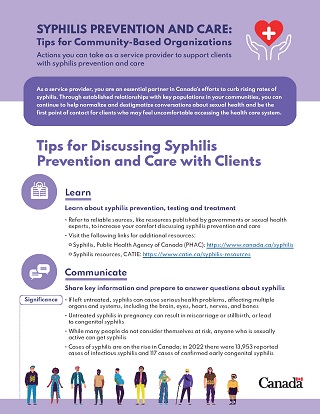Syphilis prevention and care: Tips for community-based organizations
Download in PDF format
(677 KB, 2 pages)
Organization: Public Health Agency of Canada
Date published: 2024-03-20
Actions you can take as a service provider to support clients with syphilis prevention and care
As a service provider, you are an essential partner in Canada's efforts to curb rising rates of syphilis. Through established relationships with key populations in your communities, you can continue to help normalize and destigmatize conversations about sexual health and be the first point of contact for clients who may feel uncomfortable accessing the health care system.
Tips for discussing syphilis prevention and care with clients
Learn
Learn about syphilis prevention, testing and treatment
- Refer to reliable sources, like resources published by governments or sexual health experts, to increase your comfort discussing syphilis prevention and care
- Visit the following links for additional resources:
Communicate
Share key information and prepare to answer questions about syphilis
Significance
- If left untreated, syphilis can cause serious health problems, affecting multiple organs and systems, including the brain, eyes, heart, nerves, and bones
- Untreated syphilis in pregnancy can result in miscarriage or stillbirth, or lead to congenital syphilis
- While many people do not consider themselves at risk, anyone who is sexually active can get syphilis
- Cases of syphilis are on the rise in Canada; in 2022 there were 13,953 reported cases of infectious syphilis and 117 cases of confirmed early congenital syphilis
Transmission
- Syphilis is a sexually transmitted infection that is passed on by direct contact with an infectious lesion during genital, anal or oral sex
- Syphilis can also be passed on to babies during pregnancy through the placenta, or at birth through direct contact with an infectious lesion
- Syphilis is most contagious in the early stages when people may not notice any symptoms
TestingFootnote 1
- Syphilis is usually tested for with blood samples; swabs can also be taken of any sores or rashes
- Syphilis testing is recommended for all sexually active persons with a new partner or multiple partners, and/or upon the client's request
- Syphilis testing is recommended every 3 to 6 months for individuals with multiple sexual partners
- Universal testing is recommended for pregnant individuals during the first trimester or at their first prenatal visit, and repeat testing is recommended in the third trimester and during labour for individuals at increased risk
Treatment
- Syphilis can be treated and cured with antibiotics, usually given by injection, and can help prevent passing it on to sexual partners
- Syphilis treatment in pregnancy is safe and can prevent syphilis from being passed to developing babies
Follow-up
- Regular follow-up testing after treatment is important to confirm that the syphilis has been cured, and is an opportunity to receive key information on sexual and reproductive health for a healthy future
Notification
- Positive test results are reported to local public health units to help monitor the health of the whole community
- Only the client, their health care provider and the public health nurse will know they have an infection
- A public health nurse may offer to help the client notify current and past partners that they need to be tested
Support
Help clients navigate sexual health services and other social supports
- Visit the following links for additional resources that can help you support clients navigating sexual health services and other social supports:
Footnotes
- Footnote 1
-
For more details, see the STBBI Guides for Health Professionals: Syphilis guide: Screening and diagnostic testing on Canada.ca. Recommendations do not supersede any provincial/territorial legislative, regulatory, policy and practice requirements or professional guidelines that govern the practice of health professionals in their respective jurisdictions, whose recommendations may differ due to local epidemiology or context.
